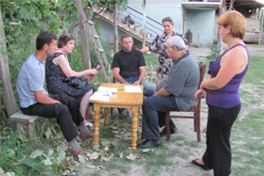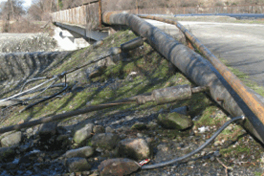 Household-level discussion: What are the main problems that must be solved in regards to the supply and treatment of water? Targeted research and implementation of small water-related pilot projects are being carried out in the village of Heretiskari (800 residents), eastern Georgia, on the border with Azerbaijan.
Photo: Archive of the Green Movement of Georgia
Household-level discussion: What are the main problems that must be solved in regards to the supply and treatment of water? Targeted research and implementation of small water-related pilot projects are being carried out in the village of Heretiskari (800 residents), eastern Georgia, on the border with Azerbaijan.
Photo: Archive of the Green Movement of Georgia
In the Caucasus region, water and pasture management arguably receive proper attention at the national and international levels (e.g. via Environmental Action Plans and the Helsinki Water Convention). But local-level resource management is another story. Many villagers in Azerbaijan and Georgia, for example, feel that their local situation is not given enough attention. As one villager put it, “Much is done in [the capital cities] Tbilisi and Baku, but what about the water problems in our villages?”
In order to address this apparent gap, the Swiss-supported programme Environment and Security promotes sustainable bottom-up approaches to natural resource management in the Caucasus South region. It is financed by the Swiss Federal Department of Foreign Affairs (FDFA) and jointly implemented by Azerbaijan’s International Hydrological Programme Association (IHPA), Georgia’s Green Movement, and CDE.
 Pictured here is an example of “self-help” on the part of villagers in Silban, who were essentially forgotten by state-level water authorities. The villagers took it upon themselves to tap the nearby water main. Six hundred people reside in the village of Silban, Azerbaijan.
Photo: Heino Meessen, CDE
Pictured here is an example of “self-help” on the part of villagers in Silban, who were essentially forgotten by state-level water authorities. The villagers took it upon themselves to tap the nearby water main. Six hundred people reside in the village of Silban, Azerbaijan.
Photo: Heino Meessen, CDE
The overall aim is to foster local-level transboundary cooperation on environmental issues by establishing sustainable partnerships between researchers, villagers, and diverse experts working on joint projects across the border in Azeri and Georgian villages. The initial launch of the programme in 2011/12 was followed up with “action research” activities. These resulted in implementation of four smaller projects on water management in cooperation with local village-based organisations. So far, the research results and micro projects have successfully advanced local-level natural resource management. The programme partners see the re-establishment of transboundary cooperation between Azeri and Georgian villages as vital, and believe it contributes significantly to related national efforts. Between 2013 and 2015, the partners aim to initiate a transboundary village-level partnership focused on common challenges in water and pasture management. It will bring together villages in the municipality of Lagodechi, Georgia, and in Azerbaijan’s Zakatala and Belokan districts.